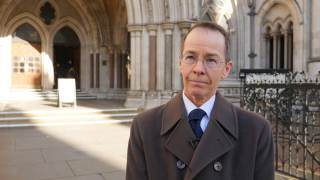Why it matters that James Caspian isn't allowed to study people who regret gender transition

This week, the High Court upheld the decision made by Bath Spa University to block psychotherapist James Caspian’s research into transgender regret, saying that the case had been brought too late. Carys Moseley looks at why the Court’s judgment matters and asks, what is the point of having departments of counselling and therapy in universities if you aren’t able to research the issues that clients are raising? For if you can’t research it in a university, then where can you?
This week, the hearing of James Caspian was heard at the Royal Courts of Justice. He was prevented by Bath Spa University from carrying out a project researching people who regret gender reassignment. This was despite having already been enrolled on the university’s MA in Counselling and Psychotherapy.
The hearing was an application for a judicial review of the university’s decision and Mr Caspian was represented by Paul Diamond.
Gender transition therapist wanting to study regret
Mr Caspian is a qualified psychotherapist who has worked with patients who identify as transgendered, and he has in the past been a trustee of the Beaumont Trust, the oldest charity to work with transvestites and transgender people in the UK.
All this makes James Caspian’s case extremely significant, for having helped many people through the path of gender reassignment away from living as members of their biological sex, he later became aware that many regretted this. It is extremely rare for a therapist who has been active in supporting people through gender reassignment to be so open about this.
University too scared of attacks on social media
The hearing made it very clear that fear of incurring attacks on social media is what led the university’s sub-committee on ethics to decline Caspian’s research proposal which had been initially accepted, even though he had already been enrolled on the course. In fact, the risk was deemed too great for both the university and the researcher. The reason was that Caspian wanted to recruit more interviewees and considered posting on the online forum of the World Professional Association for Transgender Health (WPATH). WPATH is the global organisation that sets the Standards of Care for the Health of Transsexual, Transgender and Gender-Nonconforming People.
This begs questions about the university’s confidence in the abilities of its own staff, both academic and administrative, to handle highly controversial topics in research. Whilst several universities in the UK have been caught in the crosshairs of debates about ‘no-platforming’ of speakers who are critical of transgender politics, typically this has been due to censorship carried out by Student Unions meeting on university premises. This case is the first one where a student – and a student with a professional background in his chosen subject; essentially, someone who already had the right credentials to carry out the research – has been prevented from carrying out research on transgender issues due to its being too much of a perceived risk.
Judge acknowledged issues of academic freedom of expression
The judge, Michael Kent QC, did acknowledge that the case touched on major issues of academic freedom of expression. The problem in his view was that Caspian brought his case for a judicial review of the university’s decision too late after the university had made it.
He also said that Caspian should have gone against the Office for the Independent Adjudicator, not the university.
Fear leads to corporate academic self-censorship
The extraordinary thing about this case is not only that the university declined James Caspian’s research proposal having previously accepted it. It is also that the university feared risks of social media attacks upon itself. This means that the university as an institution is prepared to limit its corporate academic freedom in order not to face risks.
Given that transgender politics cuts to the heart of the importance of telling the truth about human nature, this should be viewed as a serious no-no for any university. This is not even like an incident where someone has said something that is highly critical of transgender politics and medical gender reassignment, and where that ‘something’ has been reported to the police as a ‘hate incident’. It is fear of that sort of thing happening. Did the university not consider that it should prepare to defend itself robustly against the risk of such vicious attacks?
Have universities lost track of their mission?
Acquisition of knowledge in counselling and therapy must come via free discussion between professionals and clients. This is then organised into various kinds of publications which are then peer-reviewed. Without this, students would be reduced to reading textbooks with a limited shelf-life, and not keeping abreast of developments in the field, let alone studying how clients and professionals are affected by their interaction with social trends.
What is the point of having university departments of counselling and therapy if it is not possible to study clients who have come forward of their own accord to discuss prior therapy which they now believe damaged their lives?
Need for more clinical research on transgender regret
Searching the database of Index to Theses, the database of dissertations completed in UK universities, one finds very many dissertations on transgender issues. However, hardly any are clinical studies. There are none specifically on regretting gender reassignment. This speaks volumes as to why research such as what was proposed by James Caspian is needed. When he spoke at the first parliamentary event organised by David TC Davies MP on the government’s proposal to make gender change easier in October 2017, James Caspian spoke of the problem that proper clinical research on transgender issues was not really being conducted to the same degree as in the past. The field had been progressively taken over by activists. The question is, if you cannot study this in a university, which is supposed to be an independent seat of learning and critical thinking, where can you raise the issues?
